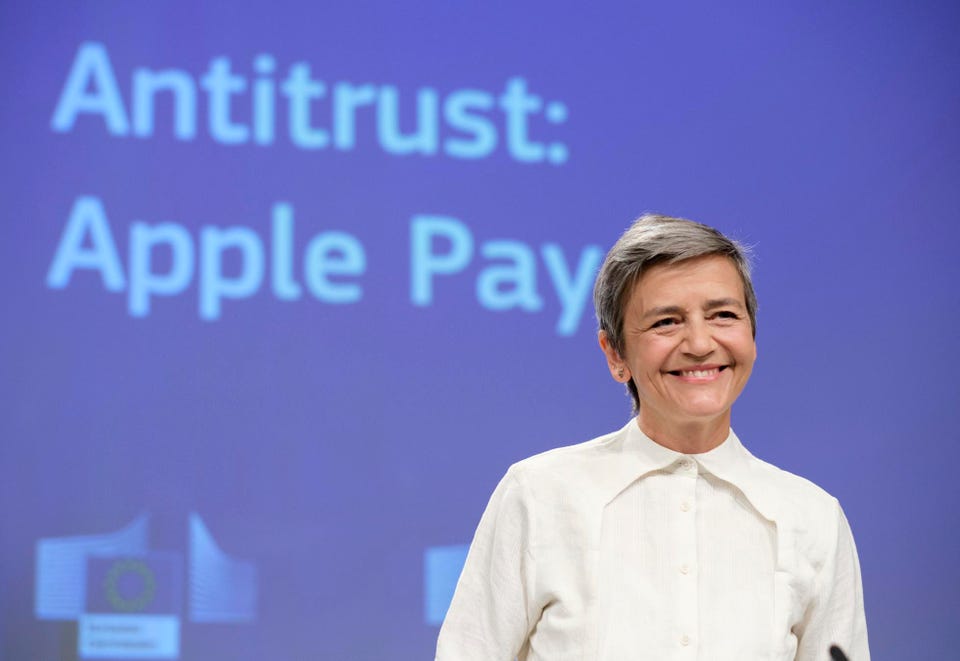Fintech CFPB Accuses Apple Of Potential Consumer Data Misuse With Its ‘Buy Now, Pay Later’ Service Ron Shevlin Senior Contributor Opinions expressed by Forbes Contributors are their own. Observations from the Fintech Snark Tank New! Follow this author to improve your content experience. Got it! Jul 27, 2022, 06:30pm EDT | New! Click on the conversation bubble to join the conversation Got it! Share to Facebook Share to Twitter Share to Linkedin CUPERTINO, CALIFORNIA – SEPTEMBER 12: Tim Cook, chief executive officer of Apple, speaks during an .
. . [+] Apple event at the Steve Jobs Theater at Apple Park on September 12, 2018 in Cupertino, California.
Apple is expected to announce new iPhones with larger screens as well as other product upgrades. (Photo by Justin Sullivan/Getty Images) Getty Images OBSERVATIONS FROM THE FINTECH SNARK TANK Apple’s announced buy now, pay later (BNPL) service—Apple Pay Later—is being investigated by the Consumer Financial Protection Bureau (CFPB), the consumer finance regulator in the US. CFPB director Rohit Chopra said that Apple Pay Later raised “a host of issues,” including antitrust and data privacy concerns.
According to the Financial Times : “The top US consumer finance regulator has warned that Big Tech’s entry into the buy now, pay later lending business risks undermining competition in the nascent sector and raises questions about the use of customer data. Among the issues the agency would consider was “whether it may actually reduce competition and innovation in the market”, Chopra said in an interview. ” Chopra also said that Big Tech’s entry into the lending business raises questions regarding how companies use customer data, including browsing history, geolocation history, and health data.
Oh, The Irony Apple using customer data inappropriately? No way! The prospect of (potentially) being accused of data privacy violations is ironic. Just six weeks ago, CNBC reported that Apple CEO Tim Cook was pushing for privacy legislation “as soon as possible” after a visit to Congress. As CNBC wrote: MORE FOR YOU Shares Of Money-Transfer Fintech Remitly Rise 13% In IPO, Valuing It At $7.
8 Billion CDP – Environmental Disclosure Platform Probing The E in ESG Digital Identity Should Be A Big Business For Banks “Apple has long positioned itself as the most privacy-focused company among its tech peers, and Cook regularly addresses the issue in speeches and meetings. Apple says that its commitment to privacy is a deeply held value by its employees, and often invokes the phrase ‘privacy is a fundamental human right’. ” The CFPB’s Misguided Concerns Some of the CFPB’s concerns are off the mark.
Its concern that Apple has a lot of consumer payment data from its current payment services overlooks the facts that: Apple Pay usage lags. According to a Q1 2022 study from Cornerstone Advisors, roughly half (52%) of consumers with a smartphone and a checking account make mobile person-to-person (P2P) payments. Three-quarters of those consumers use PayPal, 43% use CashApp, and just 26% use Apple Pay.
Apple Card growth is anemic. After seeing a doubling of Apple Card holders in 2020, growth in 2021 slowed to a crawl. Cornerstone found that the number of consumers with an Apple Card grew from 6.
4 million at the beginning of 2021 to just 6. 7 million at the start of 2022. 9to5 Mac commented that the CFPB is concerned that BNPL programs increase consumer debt and quoted Chopra as saying: “In order to have real visibility into the state of household balance sheets, we can’t just look at credit card debt or auto loan debt.
We’ve got to now look at buy now, pay later debt as well. ” Yes, let’s look at BNPL debt. According to CR Research , the average total BNPL debt owed by users of the programs is $883.
In contrast, Americans; average credit card debt is currently at $5,221 (down from $6,194 in 2019). It may just be a statistical coincidence, but the number suggest that consumers have replaced a portion of their credit card debt with an equal amount of BNPL debt. In terms of its concerns regarding the undermining of competition in the space, CR Research’s analysis shows that PayPal is really the 800-pound gorilla in the BNPL space with 57% market share, followed by Afterpay (29%), Affirm (28%), Klarna (23%) and ZipPay (19%).
If the CFPB wants a behemoth to go after in this space, it should look at PayPal. The CFPB’s Warning Shot The CFPB isn’t really serious about bringing up antitrust and privacy charges against Apple. The Big Tech company is simply the regulator’s canary in the coal mine, sending a message to all of the platforms that detrimental use of customer data to maximize revenue and profits will be scrutinized.
It will be up to the platforms to prove that the data the consumer data they use to provide credit—in any form, not just buy now, pay later programs—is increasing consumers’ access to credit, and increasing that access at a reasonable cost. Follow me on Twitter or LinkedIn . Check out my website .
Ron Shevlin Editorial Standards Print Reprints & Permissions.
From: forbes
URL: https://www.forbes.com/sites/ronshevlin/2022/07/27/cfpb-accuses-apple-of-misusing-consumer-data-with-its-buy-now-pay-later-service/



